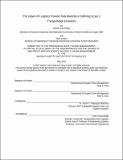| dc.description.abstract | Global warming is a reality. According to the UN’s Intergovernmental Panel on Climate Change, the Earth’s average temperature may increase by another 1.5°C to 2.0°C in the next thirty years, causing extreme weather, deteriorating air quality, depleting resources, and disrupting economies. By 2025, an estimated 1.8 billion people worldwide may suffer absolute water scarcity. Xylem Inc. is among the companies aiming to reduce its carbon footprint to offset this trajectory. Xylem aims to reduce its supply chain carbon footprint by 2.8 million metric tons by 2025. Among supply chain activities, transportation and logistics remains one of the greatest contributors to carbon emissions. To help the company take swift climate action, our capstone helps Xylem understand emissions hotspots along its inbound transportation network and identify emissions reduction initiatives by way of establishing an accurate and reliable Scope 3 emissions baseline. By developing a hybrid activity-based emissions calculation tool, we assessed the data maturity of Xylem’s top ten logistics suppliers, added supplier evaluation criteria, and provided means to overcome data limitations. We quantified trade-offs between emissions and commercial levers (e.g., cost, customer service level, etc.) and estimated the emissions effects of supply chain decisions using scenario, comparative, and regression analysis. The results show that shipment mode selection, shipment weight, shipment type, and shipment transit time have a meaningful impact. The combined effects of these variables, coupled with supplier selection, may help Xylem reduce up to 50% of its inbound transportation carbon footprint. The outputs of our study include a set of tailored demand and production planning, sourcing and procurement, inventory management, and customer relationship management recommendations and a prioritized implementation roadmap to support Xylem in its pledge towards net zero operations. | en_US |
